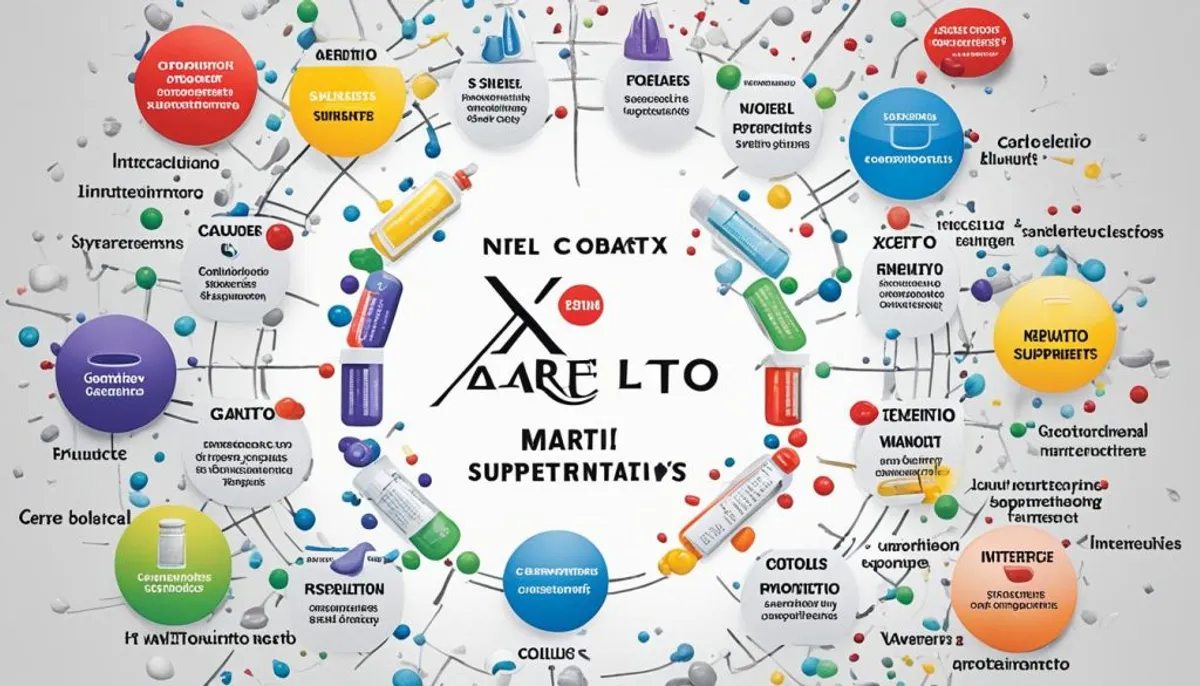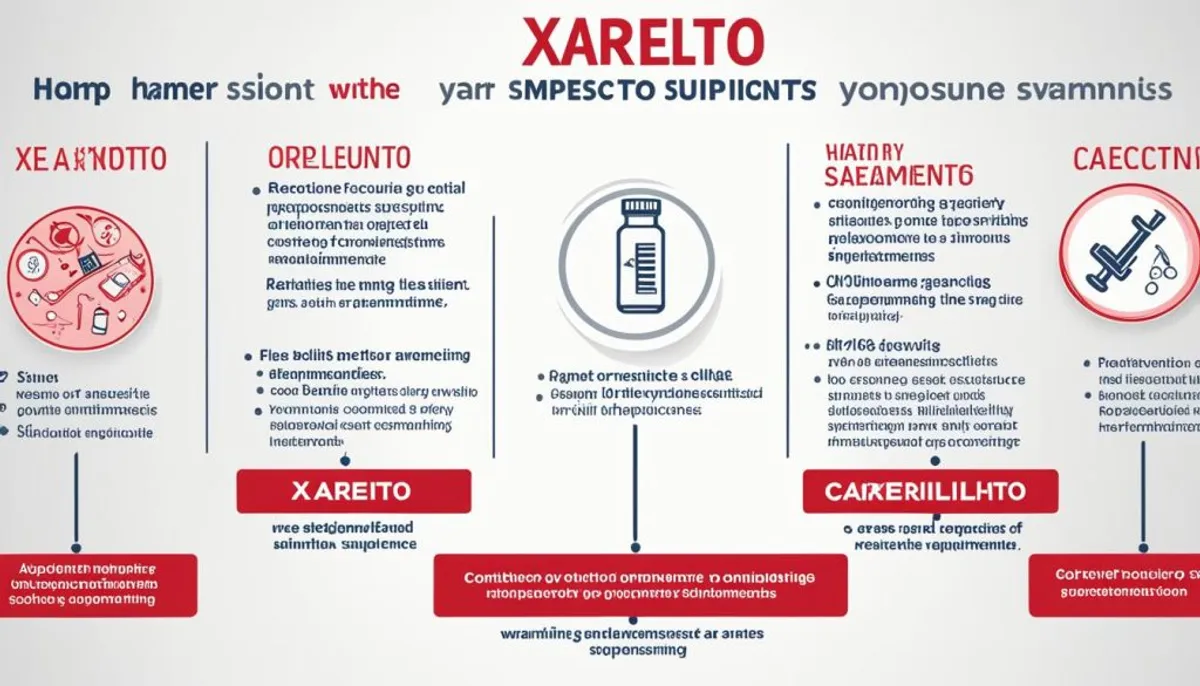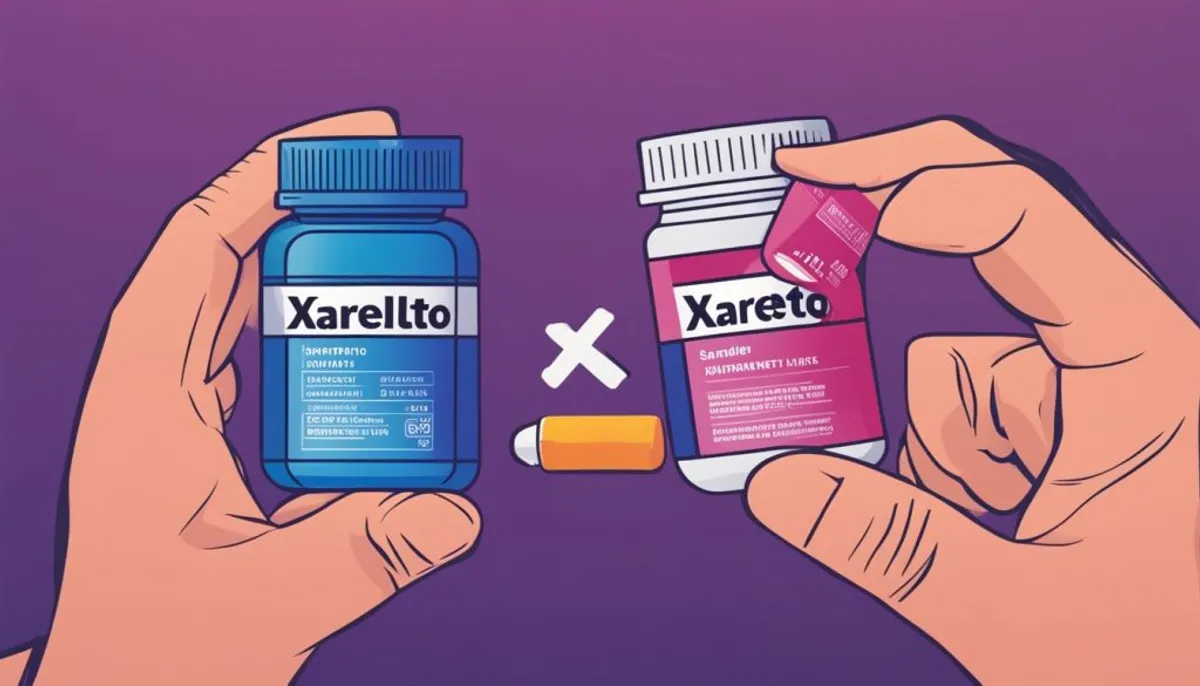If you’re taking Xarelto (rivaroxaban), knowing about potential interactions with supplements is key. Xarelto might not mix well with some vitamins, minerals, and herbal products. This could affect how well it works or its safety. It’s important to understand these xarelto interactions with supplements, xarelto drug interactions, and rivaroxaban side effects. This knowledge helps keep your anticoagulant medication safe and makes sure blood thinners and supplements work well together.

This article will cover what you need to know about Xarelto and supplements. We’ll help you manage your treatment safely and effectively. By being informed, you can safely add supplements to your routine while taking this important blood thinning medication.
Introduction to Xarelto and Interactions
Xarelto is a common prescription drug used to prevent and treat blood clots. It’s important to know how it works and its interactions with other drugs and substances. This knowledge helps ensure it’s used safely and effectively.
What is Xarelto and How Does it Work?
Xarelto is a medication that stops blood clots from forming and growing. It does this by blocking a clotting factor called Factor Xa. By stopping Factor Xa, Xarelto lowers the chance of clots forming. This makes it a key treatment for many heart and blood-related conditions.
Understanding Drug Interactions with Xarelto
Drug interactions happen when one drug changes how another drug works in the body. These changes can affect how well Xarelto works, possibly leading to more bleeding or less benefit. It’s important for patients on Xarelto to know about these interactions and talk to their doctors about them.
| Interaction Type | Potential Impact | Example Drugs |
|---|---|---|
| Increased Bleeding Risk | Concurrent use can increase the risk of bleeding | NSAIDs, antiplatelet drugs |
| Reduced Xarelto Effectiveness | Can decrease the blood-thinning effects of Xarelto | Antifungal medications, certain antibiotics |
Knowing about drug interactions with Xarelto helps patients use this important blood thinner safely and effectively.
Contraindications and Precautions with Xarelto
It’s important to know about the Xarelto contraindications and precautions. Xarelto contraindications are health issues or factors that make taking this drug risky.
When Should Xarelto Be Avoided?
Avoid Xarelto in these situations:
- Active bleeding or a high risk of bleeding, such as from a recent surgery or injury
- A history of allergic reaction to Xarelto or any of its ingredients
- Severe liver disease or impairment
- Pregnancy, as Xarelto can harm the developing fetus
- Breastfeeding, as Xarelto may pass into breast milk
Alcohol Consumption and Xarelto
There’s no direct link between alcohol and xarelto. But, drinking alcohol while taking Xarelto could increase your risk of bleeding. It’s best to limit or avoid alcohol to reduce bleeding risks.
If you’re unsure about when to avoid xarelto or its effects, talk to your healthcare provider. They can help you understand the risks and benefits. This way, you can make the best health choices for you.

Xarelto Interactions with Other Medications
Managing your health means knowing how Xarelto interacts with other drugs. Xarelto is an anticoagulant often prescribed. It can work with or against certain medications like NSAIDs, antiplatelet drugs, anticoagulants, and antifungal drugs.
NSAIDs and Antiplatelet Drugs
Xarelto can mix with NSAIDs and antiplatelet drugs like aspirin and ibuprofen. These mixes can raise the chance of bleeding. This is because Xarelto and these drugs both affect blood clotting. Always talk to your doctor about using these drugs with Xarelto to watch for any issues.
Anticoagulants and Antifungal Medications
Xarelto also works with other anticoagulant drugs like warfarin. Taking Xarelto with these can increase bleeding risks. Some antifungal drugs, like ketoconazole, can make Xarelto levels go up. This might lead to more side effects.
It’s key to tell your doctors about all the drugs you’re on, including things you buy over the counter. Working with your healthcare team helps avoid bad interactions and manage your health well.
| Medication Class | Potential Interaction with Xarelto | Potential Consequence |
|---|---|---|
| NSAIDs | Increased risk of bleeding | Increased risk of bleeding complications |
| Antiplatelet Drugs | Increased risk of bleeding | Increased risk of bleeding complications |
| Anticoagulants | Increased risk of bleeding | Increased risk of bleeding complications |
| Antifungal Medications | Increased blood levels of Xarelto | Increased risk of side effects from Xarelto |
Xarelto Interactions with Supplements
When taking Xarelto, it’s important to watch out for interactions with supplements, herbs, and vitamins. Xarelto helps prevent blood clots. But, some natural products can change how well or safely it works.
Be careful with the herb St. John’s wort. It can lower Xarelto levels in your body. This means Xarelto might not work as well to prevent blood clots. Always tell your doctors about any xarelto and herbal remedies you’re using, including St. John’s wort.
Xarelto and vitamins usually don’t cause big problems. But, there’s no guarantee they won’t interact. Always talk to your doctor or pharmacist about any xarelto interactions with supplements you’re taking.
It’s key to keep your healthcare team in the loop when you’re on Xarelto. Tell them about all supplements, herbs, and vitamins you’re using. They can adjust your Xarelto or other medications if needed.

| Supplement | Interaction with Xarelto |
|---|---|
| St. John’s Wort | Lowers Xarelto levels, making it less effective |
| Vitamins | No known significant interactions |
Managing Xarelto Interactions
If you’re taking Xarelto, it’s key to manage potential interactions well. Talk often with your healthcare providers and watch for side effects.
Steps to Take with Potential Interactions
Here are steps to handle Xarelto interactions:
- Tell your doctor and pharmacist about all your meds, supplements, and other substances. This helps your team check if Xarelto is safe with them. They can also tell you how to lower interaction risks.
- Look out for bleeding or other side effects and tell your team right away. Quick action can prevent serious problems.
- Always follow your doctor’s advice on taking Xarelto, like the right dose and timing. This includes any special instructions, like taking it with food.
- Don’t change your Xarelto plan without talking to your doctor first. Sudden changes can raise interaction and complication risks.
Informing Healthcare Providers about Xarelto
Talking openly with your healthcare providers is key when dealing with Xarelto interactions. Make sure to:
- Tell them all the meds and supplements you’re on, including things you buy over the counter or herbal remedies. This helps your team spot potential interactions and adjust your treatment.
- Report any side effects or changes quickly. This lets them make changes to your Xarelto use if needed.
- Ask questions if you’re worried about Xarelto interactions or your treatment plan. Your healthcare team is there to help and keep you safe.
Being proactive and talking with your healthcare team can help manage Xarelto interactions. This can reduce the risk of problems.
Conclusion
Xarelto is a key medicine for stopping and treating blood clots. It can work with many supplements and other items. By knowing about these interactions, patients can use Xarelto safely and well.
It’s important to tell your doctors about all the medicines and supplements you take. Listen to their advice and watch for any side effects or changes in your health. This way, you can use Xarelto right and keep your health in check.
Knowing how Xarelto interacts with other things is key for those using this blood thinner. By focusing on safety, working with your healthcare team, and staying alert, you can handle your treatment well. We can help you through this part of your care and support your path to better health.
RelatedRelated articles



